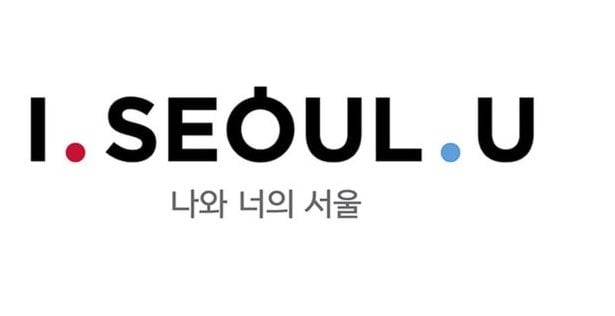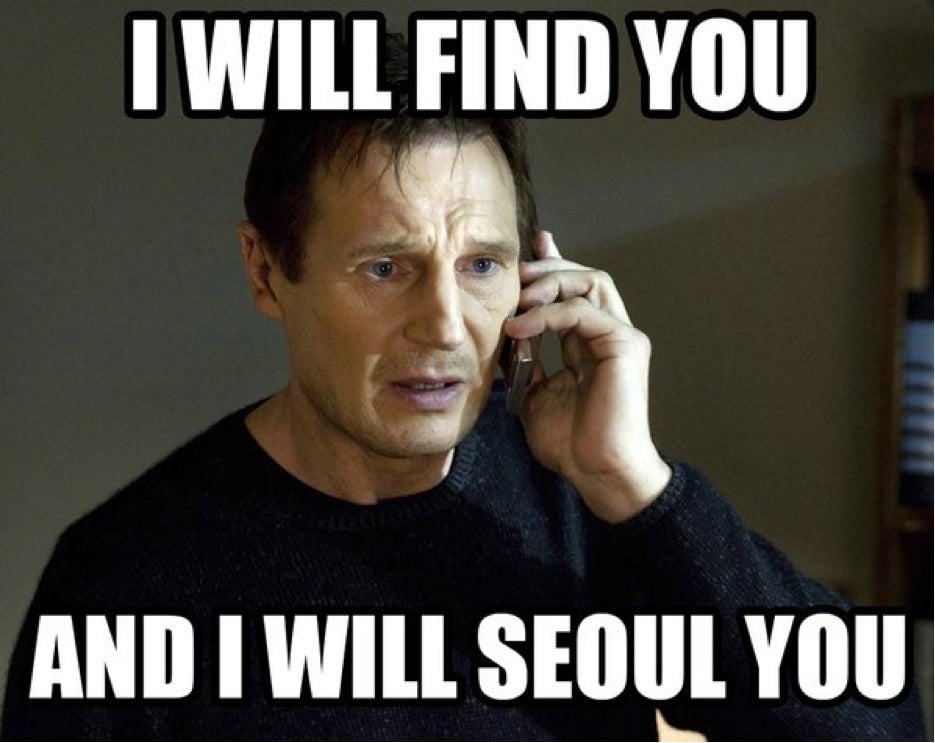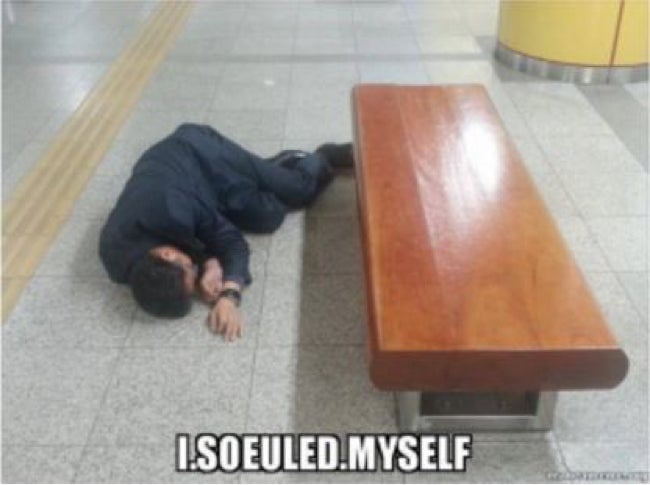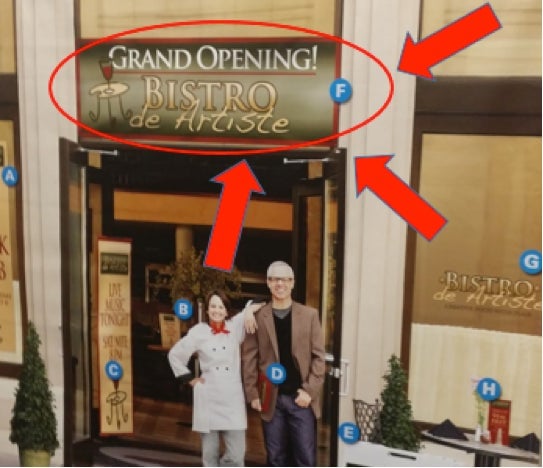Korea’s newest slogan is Seoul stupid
Korea, please stop making a liar of me. I wrote a whole frigging book on how Korea became the coolest country on earth, and now this.


Korea, please stop making a liar of me. I wrote a whole frigging book on how Korea became the coolest country on earth, and now this.
On October 28, the Seoul Metropolitan Government announced the city’s official new slogan: “I. Seoul. U.”
This is amateur hour. This is “keep your inspectors out of our sweatshops and nuclear reactors” stuff. This is “our economy is based on plush toys” stuff. Cool countries do not make official slogans for their capital city that sound like the English-language cooking instructions on a ramen package.
It only took a few hours for “I. Seoul. U” to become an international laughingstock, inevitably giving rise to mockery via this classic Liam Neeson meme:

“I.Seoul.U” was selected by way of crowdsourcing, or at least what counts as crowdsourcing in Korea. Nine experts and 1140 Seoul residents were asked to vote for one of three choices: “I.Seoul.U” won over “Seouling,” with “Seoulmates” coming in last place.
The problem begins with the ballot choices. Absolutely everyone I know thinks “I. Seoul. U” is terrible, so it seems statistically improbable that the decision-makers received no prior warning. And surely someone might have mentioned that, just as you can’t pick your own nickname (I still have not managed to get people to call me Lizzy Bennett), you can’t pick how people will interpret the verbification of your name either. Hence the memes speculating what the verb “to Seoul” might mean–apparently, the enduring Korean pastime of drinking and passing out in public:

Crowdsourcing is unusual for the choosing of official slogans. Usually, what happens is that whichever Korean PR firm won the slogan contract will invite a group of semi-prominent expats in Korea–anywhere from a few dozen to a few hundred–to a dinner and presentation, after which the expats give input.
American expat professor Michael Hurt, Director of Cultural Studies at the Busan University of Foreign Studies, has frequently been recruited to “advise” government and city branding and slogan-making initiatives in Korea. Hurt said he’s found that his presence is completely superfluous. “It’s all window dressing,” said Hurt. “Most of the time we find out that the decision had already been made. They’re not supposed to listen to any shit we have to say, anyway. They just want a rubberstamp from a foreign face.”
The slogan selection panel reportedly released a statement saying, “We have already collected the opinion of experts in English and they said the logo is communicable in modern English.”
Who are these expats? Please, write to me.
Foreigners in Korea have been putting up with garbled English (sometimes called “Konglish”), for decades. Who can forget the 2002 Korean World Cup team’s official slogan, emblazoned on a sea of thousands of red t-shirts: “Be the Reds!”
Then there was the official theme song for the 1988 Seoul Olympics, recorded by the popular German pop band Dschinghis Khan. Called “Korea,” the lyrics were entirely in English, and while grammatically correct, definitely had that special Europop I-like-to-practice-my-English vibe to it: “I need your love, my long-distance girl…Why can’t we be faster than light? Faster than airplanes, my precious love.”
But in social media terms, 2002 and 1988 are pre-historic. Now, Koreans are among the world’s heaviest users of social media. One messaging app, KakaoTalk, reportedly sees 7 billion messages a day. This in a country with only 50 million people.
Korea’s social networks and blogs were abuzz with comments from Koreans such as “It makes no sense and it sounds really juvenile.” (link in Korean)
Twenty years ago, it would have been unthinkable to run this headline from the Nov. 10 edition of the Joong-Ang daily: “No one knows what I.Seoul.U means, so why be so stubborn about keeping it?” (link in Korean)
Seoul mayor Park Won-soon has proven inflexible about retaining “I.Seoul.U”. At a press luncheon on Nov. 9, according to the Korea Herald, Park defended the slogan by randomly throwing India under the bus:
[Park said] ”[For example], the slogan “Incredible India” is a great one, but because its meaning is unchangeable, it can only be used for a short time.
“On the other hand, ‘I.Seoul.U’ can mean anything.”
So the beauty of the slogan, in the mayor’s eyes, is that it is meaningless. Great. Then again, given Korea’s past adventures in trying to create meaningful English phrases, maybe a slogan devoid of meaning is an improvement?
But really, I have zero tolerance for idiomatic errors in translation. I’m not sure why, given that everyone makes these kinds of mistakes. There’s this one cafe in Paris where they menu appears in both French and English, and the English translation offered such howlers as “Shrimp stuffed lawyer,” because the word “avocat” in French means both avocado and lawyer.
Americans do it too, in a big way. A family friend was an L.A.-based child actor who appeared on M*A*S*H as a Korean orphan. The director essentially told him to make up fake Korean words because the real ones didn’t sound Korean enough.
Americans don’t care about European languages either, not even Fortune 500 companies like FedEx. This poster in my local FedEx branch in Boston, which advertises small business solutions, makes me very upset. It depicts a mom and pop type French restaurant called “Bistro de Artiste.” By which they probably mean Bistro des Artistes. It’s the type of subtle error that makes the difference between a French-seeming restaurant and one that was named by a first-year high school French student who didn’t pay attention in class:

Every nation has a blind spot that manifests itself in its attitudes toward other languages. America’s Achilles’ heel is its “America, Fuck Yeah!”–other cultures don’t matter (the same mentality that gives rise to racist Halloween costumes). The French are known for their sense of national exceptionalism, and mistakes in English often go unchecked because Parisians don’t care about tourist revenue enough to give a toss about what foreigners think of them.
For Korea, at least on an individual, day-to-day level, their perpetual and repeated flaw is that the emperor keeps buying invisible clothes, and his minions respond by turning the whole shoreline into a gigantic nudist beach.
Whoever is responsible for this slogan: I will find you and I will Seoul you.